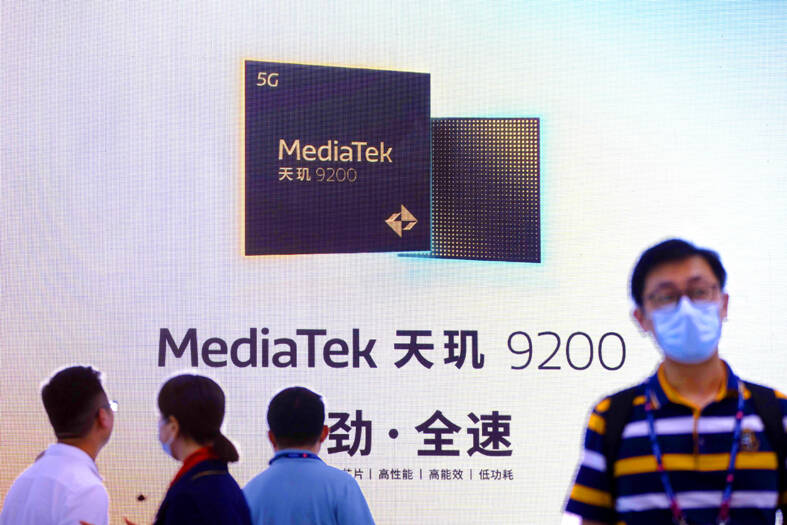MediaTek Inc (聯發科), the world’s biggest supplier of 5G mobile chips, yesterday launched its latest Dimensity 6000 series chipset, seeking to capitalize on growing demand for affordable 5G smartphones in emerging markets including India.
The Hsinchu-based chip designer’s product launch comes as India and Southeast Asian countries have become a new growth area for mobile phone chip suppliers, with growth in 5G phone sales in the region bucking a downward trend in the overall smartphone market.
For example, 5G penetration in India is expected to reach 40 percent this year, compared with 20 percent last year, MediaTek said.

Photo: AP
“As developing markets continue rolling out 5G networks at a rapid pace and operators in developed markets work to finish transitioning consumers from 4G LTE to 5G, there has never been a more vital need for chipsets that cater to the growing number of mainstream mobile devices,” CH Chen (陳俊宏), deputy general manager of MediaTek’s wireless communications business unit, said in a statement.
Global smartphone shipments are expected to drop to 1.1 billion units this year due to high inflation and macroeconomic uncertainty, while 5G penetration worldwide would rise to about 55 percent, the company said.
The first smartphone featuring the Dimensity 6100+ chipset, made with 6-nanometer technology, is to be available next quarter, it said.
MediaTek would also increase its offering of flagship 5G processors as it plans to launch its third-generation flagship system on a chip, the Dimensity 9300 series, later this quarter, it added.
The company on Monday reported that revenue last month grew 21.07 percent sequentially to NT$38.22 billion (US$1.22 billion), but was down 25.1 percent annually.
Second-quarter revenue was NT$98.14 billion, up 2.6 percent from the previous quarter and in line with the firm’s forecast of between NT$91.8 billion and NT$99.5 billion, it said.
The smartphone chip segment was the biggest revenue contributor to MediaTek, making up about 46 percent of revenue in the first quarter, company data showed.
In April, MediaTek said the consumer electronics segment was down due to soaring inflation, adding that it expects mobile phone chip revenue to pick up sometime during the second half of this year.

TRADE WAR: Tariffs should also apply to any goods that pass through the new Beijing-funded port in Chancay, Peru, an adviser to US president-elect Donald Trump said A veteran adviser to US president-elect Donald Trump is proposing that the 60 percent tariffs that Trump vowed to impose on Chinese goods also apply to goods from any country that pass through a new port that Beijing has built in Peru. The duties should apply to goods from China or countries in South America that pass through the new deep-water port Chancay, a town 60km north of Lima, said Mauricio Claver-Carone, an adviser to the Trump transition team who served as senior director for the western hemisphere on the White House National Security Council in his first administration. “Any product going

High above the sparkling surface of the Athens coastline, the cranes for building the 50-floor luxury tower centerpiece of Greece’s future “smart city” look out over the Saronic Gulf. At their feet, construction machinery stirs up dust. Its backers say the 8 billion euro (US$8.43 billion) project financed by private funds is a symbol of Greece’s renaissance after the years of financial stagnation that saw investors flee the country. However, critics see it more as a future “ghetto for the rich.” It is hard to imagine that 10km from the Acropolis, a new city “three times the size of Monaco”

STRUGGLING BUSINESS: South Korea’s biggest company and semiconductor manufacturer’s buyback fuels concerns that it could be missing out on the AI boom Samsung Electronics Co plans to buy back about 10 trillion won (US$7.2 billion) of its own stock over the next year, putting in motion one of the larger shareholder return programs in its history. South Korea’s biggest company would repurchase the stock in stages over the coming 12 months, it said in a regulatory filing on Friday. As a first step, it would buy back about 3 trillion won of paper starting today up until February next year, all of which it would cancel. The board would deliberate on how best to effect the remaining 7 trillion won of buybacks. The move

In a red box factory that stands out among the drab hills of the West Bank, Chat Cola’s employees race to quench Palestinians’ thirst for local products since the Gaza war erupted last year. With packaging reminiscent of Coca-Cola’s iconic red and white aluminum cans, Chat Cola has tapped into Palestinians’ desire to shun brands perceived as too supportive of Israel. “The demand for [Chat Cola] increased since the war began because of the boycott,” owner Fahed Arar said at the factory in the occupied West Bank town of Salfit. Julien, a restaurateur in the city of Ramallah further south,